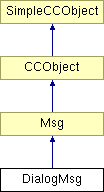
#include <msg.h>
Inheritance diagram for DialogMsg:

Public Member Functions | |
| DialogMsg (CWindowID DlgID, CDlgMessage Msg, CGadgetID Gadget, UINT_PTR LongParam=0, CDlgResID Pageid=0) | |
| DialogMsg (const DialogMsg &msg) | |
Public Attributes | |
| CWindowID | DlgWndID |
| CDlgMessage | DlgMsg |
| CGadgetID | GadgetID |
| UINT_PTR | DlgMsgParam |
| CDlgResID | PageID |
Private Member Functions | |
| CC_DECLARE_DYNAMIC (DialogMsg) | |
When processing the DialogMessage you should always use the IS_OUR_DIALOG_MSG macro. In normal circumstances this will return TRUE if the DlgWndID of the message is the same as the DialogOps window ID. However sometimes it is neccessary to send a DialogMsg to all DialogOps. For example when Camelot is dying we need to send a DIM_CANCEL to all open dialogs. The IS_DIALOG_MSG macro provides clever handling to ensure that all open DialogOps receive this message. in this situation the DlgWndID will be NULL. So when handling the DIM_CANCEL message you should not assume that DlgWndID is a valid window identifier.
after processing the dialog message you should always
return(DLG_EAT_IF_HUNGRY(DlgMsg));
The DLG_EAT_IF_HUNGRY macro will return EAT_MSG if the message should not be sent on to other dialogOps and OK if it should.
Syntax of constructor is: DialogMsg(CWindowID DlgID, CDlgMessage Msg, CGadgetID Gadget, INT32 LongParam=0)
EAT_IF_HUNGRY
Definition at line 204 of file msg.h.
|
||||||||||||||||||||||||
|
Definition at line 220 of file msg.h. 00220 : 00221 DlgWndID(DlgID), DlgMsg(Msg), GadgetID(Gadget), DlgMsgParam(LongParam), PageID(Pageid) 00222 { 00223 }
|
|
|
Definition at line 224 of file msg.h. 00224 : 00225 DlgWndID(msg.DlgWndID), DlgMsg(msg.DlgMsg), GadgetID(msg.GadgetID), DlgMsgParam(msg.DlgMsgParam), PageID(msg.PageID) { } // copy constructor
|
|
|
|
|
|
|
|
|
|
|
|
|
|
|
|
|
|
|
 1.4.4
1.4.4